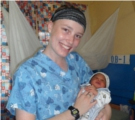Research and other internships are a wonderful way of getting hands-on experience in your area of interest. The Biological and Health Sciences department encourages its majors to get involved with research/internships either on or off campus.
Biological and Health Sciences Research
Students also have opportunity to work with faculty during the summer. Each summer the Science Division of Wheaton College provides opportunities for students to conduct funded research with Wheaton faculty members. Students work for 8-10 weeks during the summer conducting research with faculty mentors. They receive a stipend provided by various sources of funding to the College andfree Housing provided through the College.
The Selection Process
During the academic year students have many opportunities to learn of the research being conducted by their professors, and often they may even be able to begin doing research with them. Students who are interested in participating in the Summer Research Program should contact faculty members directly and express their interest. If a faculty member has research opportunities available for the summer, the student and faculty member may jointly file an application for the Summer Research Program.
Benefits of Participating
Students who do Summer Research derive both short- and long-term benefits from their participation. Students learn important scientific concepts, master new skills, and get first-hand exposure to the world of scientific research. This experience enriches their education and also helps them to know if a career involving research might be right for them.
The long-term benefits include those that relate to success in the future. Students routinely find that it is beneficial to list research experience on applications for graduate school, medical school, jobs, and research opportunities at other institutions. Success in one area often leads to successes in other areas as well! Often, in addition to simply completing the project, students have the opportunity to present their research at scientific meetings or even to co-author a publication with their faculty mentor. Such accomplishments are well worth adding to one's resume.
A final benefit of conducting research is sharing in the process of discovery with other scientists. For faculty members at Wheaton, making a scientific discovery is more than just an academic achievement - it's a way of seeing God at work in his creation!
Research Opportunities for Biological and Health Sciences Students
Credit can be applied (but not necessary) for research/internships, if desired, through two options.
- BIOL 495 Biological Research
- BIOL 496 Internship
Health Professions Research

BHS students interested in health professions often take SCI 229 Internship/Seminar in the Health Professions an internship spending time "shadowing" a health professional. This provides insight into what is involved in practicing the day by day aspects of the profession. BHS students often find health professions internships in the states or abroad. See links on this site for further internship information.
Faculty/Student Collaborative Research
BHS faculty have designed their research projects so that undergraduate students can participate in a way that allows them to understand the processes involved in experimental design and develop laboratory skills. Students may become involved either as volunteers or for academic credit during the academic year. They become familiar with a particular aspect of the mentor's research and, with faculty input, write a proposal describing the background, rationale, and proposed experiments.
Each student learns the necessary laboratory techniques from the mentor or other students who have experience working in the mentor's laboratory. Students may do this program during any phase of their time at Wheaton, but several have begun to participate in their first year and continued to research until graduation.
Before having this type of research experience, many students view biology as a series of topics or facts to remember but need more understanding of the scientific process that had been used to develop the current models of biological structures and functions. Most students who have this experience find that they better understand how science works, including the limitations and applications of the scientific process. This understanding helps them relate the scientific method to other ways of knowing and their Christian faith. Students are encouraged to present the results of their research at scientific meetings and to publish journal articles in collaboration with the faculty mentors. Several students have presented research results at the national meeting of the National Council for Undergraduate Research, the Argonne Science Symposium, and the annual meeting of the Federation of Experimental Biologists. Some students publish papers with their faculty mentors.
See Faculty Research Projects >